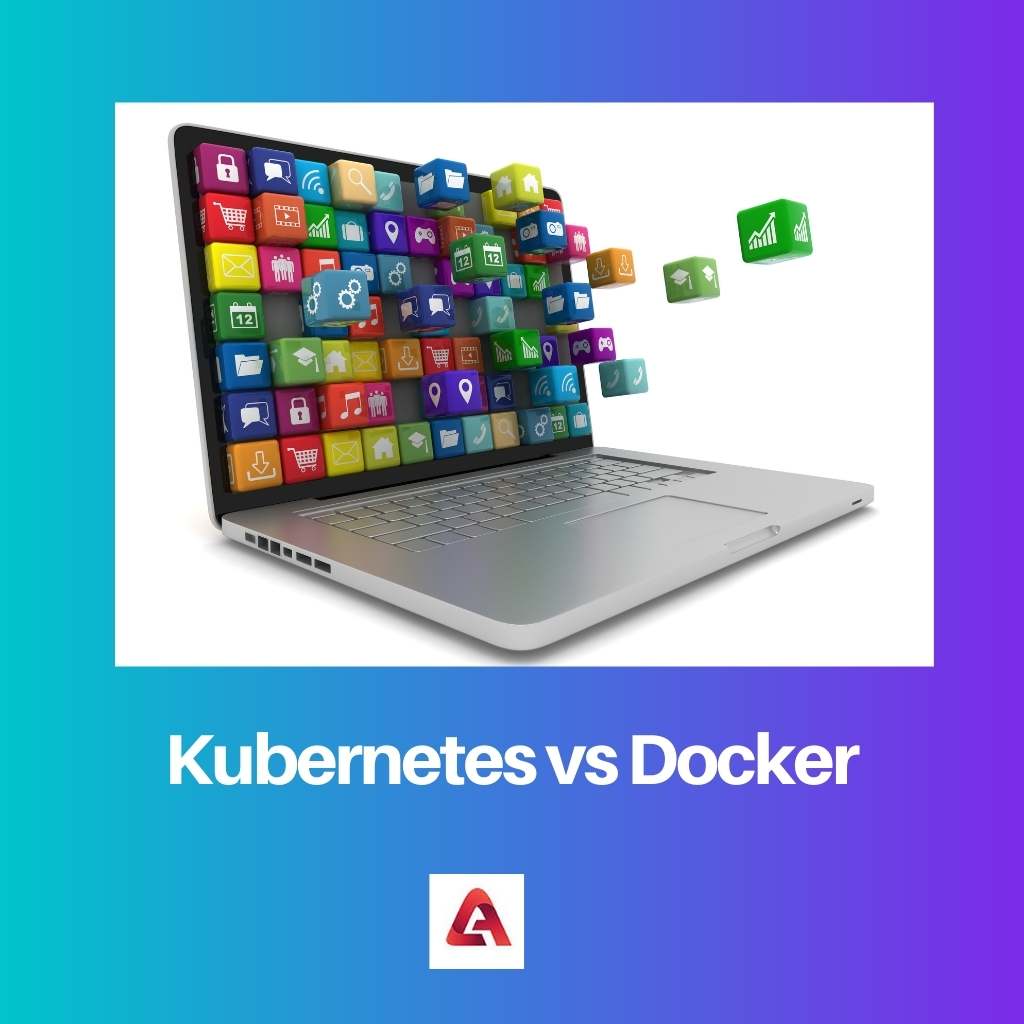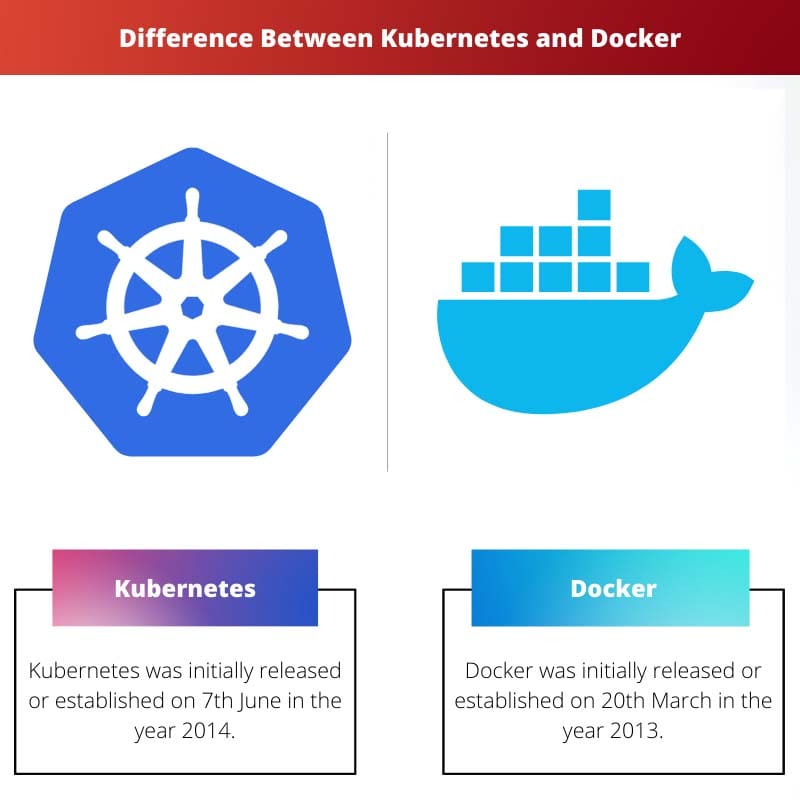A few computer software applications are used worldwide and are pretty famous among computer operators. Two of such vast and well-established computer applications are Kubernetes and Docker.
One functions on a cluster of nodes, whereas the other runs on a single node. Both applications serve very different purposes, and both have their pros and cons.
Key Takeaways
- Kubernetes is an orchestration platform for managing containerized applications, while Docker is a platform for creating and running containers.
- Docker simplifies the process of packaging and deploying applications, whereas Kubernetes manages the scaling and availability of those applications.
- Kubernetes can work with other container runtimes, not just Docker, providing more flexibility for developers and system administrators.
Kubernetes vs Docker
Kubernetes is an orchestration tool that manages containerized applications across a cluster of servers, and it is available with a free as well as paid license. Docker is a containerization platform that allows developers to package and deploy applications in a containerized format, and it is available with Apache 2.0 license pack.

Kubernetes is a computer software application that helps scale, deploy, and manage a number of applications.
Cloud Native Computing Foundation controls and manages Kubernetes which was initially designed by Google but later handed over to the Foundation.
The computer software application was released approximately seven years back in the year 2014.
Docker is a software platform that helps in packaging, deploying, and building applications in the form of packages called containers. The software was developed in the year 2013 (around eight years back) by Docker, Inc.
The operating system of Docker is Linux, Windows, and macOS. Solomon Hykes, Kamel Founadi, and Sebastien Pahl founded the software.
Comparison Table
| Parameters Of Comparison | Kubernetes | Docker |
|---|---|---|
| Initial Release | Kubernetes was initially released or established on 7th June in the year 2014. | Docker was initially released or established on 20th March in the year 2013. |
| Developer | The Cloud Native Computing Foundation is the developer of Kubernetes. | Docker, Inc is the developer of docker. |
| Significance | Kubernetes is computer software that helps manage applications with the help of several nodes grouped together into clusters. | Docker is software that helps manage applications with the help of only one node. |
| License | Kubernetes’s license is either free or paid. | Docker’s license is called Apache license 2.0. |
| Alternatives | •Google Cloud Run. • Docker Swarm. • Rancher. •AWS Fargate. | • LXC (Linux) • Artifactory Docker Registry. • Containerd (a container runtime). •Pod man. |
What is Kubernetes?
Kubernetes is an open-source computer system that helps manage, deploy, and scale several applications automatically. The software is also known as K8s.
The number “8” signifies the eight letters in the middle of “K” and “s” in the word “Kubernetes.”
Kubernetes provides a number of different types of services. There are four types of services:
- External Name
- Load Balancer
- Node Port
- ClusterIP
The software functions on several nodes that are grouped together into a “cluster.”
In a Kubernetes cluster, the API runs/ functions on port 443. The software was developed by Cloud Computing Native Foundation in the year 2014 on 7th June.
Kubernetes have certain alternatives, which are listed below:
- AWS Fargate
- Google Cloud Run
- Azure Container Instances
- Google Kubernetes Engine
- Amazon Elastic Kubernetes System
- Open Shift Container Platform
- Docker Swarm
- Nomad
- Rancher
- Azure Kubernetes Service
Kubernetes serves a number of advantages. The benefits of Kubernetes are:
- Kubernetes is quite portable and flexible.
- The system serves multi-load capability.
- Kubernetes leads the market.
- It helps reduce cloud complexity.
- Computer software helps increase one’s productivity.
- The software system helps stabilize applications.
Google originally developed Kubernetes. The Cloud Computing Native Foundation later bought it. Since then, the applications managing system has been owned by the foundation.

What is Docker?
Docker is a computer application containerization. It helps pack applications into containers. The containerization system was developed in the year 2013 by Docker, Inc.
The system faces a lot of competition in the market. Here are a few competitors:
- Oracle
- Microsoft
- Amazon Web Services
- Eclipse
- IBM
- Cloud Foundry
Docker works on the basis of single nodes. It serves its functions via TCP port 8080. It has a free/ paid license.
Docker also serves as a host network that is referred to as the Docker Host Network. It can also be called “Docker Host Networking.” It helps share the network namespace of a docker container with the host machine.
Docker serves a number of advantages/ benefits:
- Docker is a highly portable software system.
- It increases developmental growth by higher efficiency and speed.
- The system helps reduce the risks and efforts of applications.
- Dockers promote containers that help increase the speed of the deployment of various applications.
In brief, docker is a computer software platform that helps one to create, manage, deploy, and control a number of different applications. It is also referred to as a container.
This is because it helps to package, manage, and deploy a number of applications.

Main Differences Between Kubernetes and Docker
- Kubernetes was set up in 2014 on 7th June, whereas Docker was developed in 2013 on 8th March.
- Kubernetes was developed or established by Cloud Computing Native Foundation, while on the other hand, docker was established or set up by Docker, Inc.
- “K8s” is another name for Kubernetes, while on the other hand, “container” is another name for docker.
- Kubernetes functions on API port 443, whereas docker functions on TCP port 8080.
- Kubernetes runs or functions on a number of nodes ( grouped as clusters) while, on the other hand, docker runs on a single node.

- https://books.google.com/books/about/Mastering_Kubernetes.html?id=dnc5DwAAQBAJ
- https://ieeexplore.ieee.org/abstract/document/7093032/